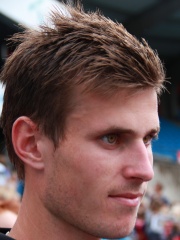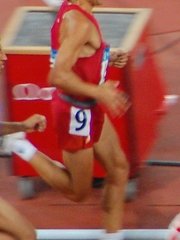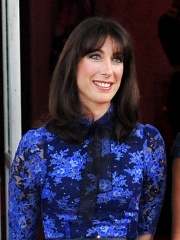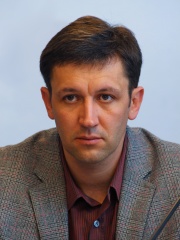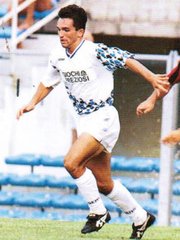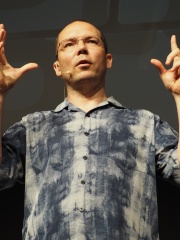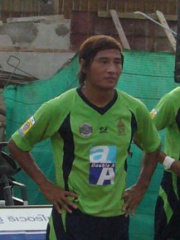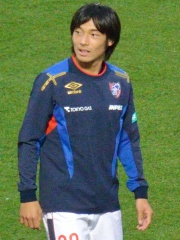Soccer Player
Takeo Harada
1971 - today
EN.WIKIPEDIA PAGE VIEWS (PV)

 Takeo Harada
Takeo Harada
Takeo Harada (原田 武男, Harada Takeo; born October 2, 1971) is a former Japanese football player and manager. Read more on Wikipedia
His biography is available in 26 different languages on Wikipedia. Takeo Harada is the 12,689th most popular soccer player (up from 13,491st in 2024), the 3,558th most popular biography from Japan (down from 2,971st in 2019) and the 1,565th most popular Japanese Soccer Player.
Memorability Metrics
Page views of Takeo Harada by language
Among Soccer Players
Among soccer players, Takeo Harada ranks 12,689 out of 21,273. Before him are Jun Amano, Takashi Yamahashi, Håvard Nordtveit, Yuki Muto, Fernando Almeida de Oliveira, and Rubén Ruiz Díaz. After him are Josip Barišić, Yoo Byung-soo, Joona Toivio, Ruslan Mingazow, Andy Delort, and Léo Silva.
Most Popular Soccer Players in Wikipedia
Go to all RankingsJun Amano
1991 - Present
HPI: 41.92
Rank: 12,696
Takashi Yamahashi
1972 - Present
HPI: 41.92
Rank: 12,697
Håvard Nordtveit
1990 - Present
HPI: 41.92
Rank: 12,698
Yuki Muto
1988 - Present
HPI: 41.92
Rank: 12,699
Fernando Almeida de Oliveira
1978 - Present
HPI: 41.91
Rank: 12,700
Rubén Ruiz Díaz
1969 - Present
HPI: 41.91
Rank: 12,701
Takeo Harada
1971 - Present
HPI: 41.91
Rank: 12,702
Josip Barišić
1981 - Present
HPI: 41.91
Rank: 12,703
Yoo Byung-soo
1988 - Present
HPI: 41.91
Rank: 12,704
Joona Toivio
1988 - Present
HPI: 41.91
Rank: 12,705
Ruslan Mingazow
1991 - Present
HPI: 41.91
Rank: 12,706
Andy Delort
1991 - Present
HPI: 41.91
Rank: 12,707
Léo Silva
1985 - Present
HPI: 41.91
Rank: 12,708
Contemporaries
Among people born in 1971, Takeo Harada ranks 1,055. Before him are Julie Foudy, Alberto García, Calpernia Addams, Gerard van Velde, Samantha Cameron, and Pavel Rostovtsev. After him are Øyvind Berg, Christoph Sieber, Allan Houston, Marco Ferrante, Kenichiro Tokura, and Jonathan Blow.
Others Born in 1971
Go to all RankingsJulie Foudy
SOCCER PLAYER
1971 - Present
HPI: 41.96
Rank: 1,049
Alberto García
ATHLETE
1971 - Present
HPI: 41.96
Rank: 1,050
Calpernia Addams
ACTOR
1971 - Present
HPI: 41.94
Rank: 1,051
Gerard van Velde
SKATER
1971 - Present
HPI: 41.93
Rank: 1,052
Samantha Cameron
BUSINESSPERSON
1971 - Present
HPI: 41.93
Rank: 1,053
Pavel Rostovtsev
ATHLETE
1971 - Present
HPI: 41.92
Rank: 1,054
Takeo Harada
SOCCER PLAYER
1971 - Present
HPI: 41.91
Rank: 1,055
Øyvind Berg
SKIER
1971 - Present
HPI: 41.89
Rank: 1,056
Christoph Sieber
ATHLETE
1971 - Present
HPI: 41.88
Rank: 1,057
Allan Houston
BASKETBALL PLAYER
1971 - Present
HPI: 41.87
Rank: 1,058
Marco Ferrante
SOCCER PLAYER
1971 - Present
HPI: 41.86
Rank: 1,059
Kenichiro Tokura
SOCCER PLAYER
1971 - Present
HPI: 41.85
Rank: 1,060
Jonathan Blow
GAME DESIGNER
1971 - Present
HPI: 41.80
Rank: 1,061
In Japan
Among people born in Japan, Takeo Harada ranks 3,565 out of NaN. Before him are Chiharu Shida (1997), Mikio Manaka (1969), Jun Amano (1991), Takashi Yamahashi (1972), Yuki Muto (1988), and Taku Takeuchi (1987). After him are Shiho Tomari (1990), Masao Kiba (1974), Ryota Moriwaki (1986), Shiho Ogawa (1988), Kana Kitahara (1988), and Katsumi Suzuki (1969).
Others born in Japan
Go to all RankingsChiharu Shida
BADMINTON PLAYER
1997 - Present
HPI: 41.94
Rank: 3,559
Mikio Manaka
SOCCER PLAYER
1969 - Present
HPI: 41.94
Rank: 3,560
Jun Amano
SOCCER PLAYER
1991 - Present
HPI: 41.92
Rank: 3,561
Takashi Yamahashi
SOCCER PLAYER
1972 - Present
HPI: 41.92
Rank: 3,562
Yuki Muto
SOCCER PLAYER
1988 - Present
HPI: 41.92
Rank: 3,563
Taku Takeuchi
SKIER
1987 - Present
HPI: 41.92
Rank: 3,564
Takeo Harada
SOCCER PLAYER
1971 - Present
HPI: 41.91
Rank: 3,565
Shiho Tomari
SOCCER PLAYER
1990 - Present
HPI: 41.90
Rank: 3,566
Masao Kiba
SOCCER PLAYER
1974 - Present
HPI: 41.89
Rank: 3,567
Ryota Moriwaki
SOCCER PLAYER
1986 - Present
HPI: 41.88
Rank: 3,568
Shiho Ogawa
SOCCER PLAYER
1988 - Present
HPI: 41.88
Rank: 3,569
Kana Kitahara
SOCCER PLAYER
1988 - Present
HPI: 41.87
Rank: 3,570
Katsumi Suzuki
SOCCER PLAYER
1969 - Present
HPI: 41.87
Rank: 3,571
Among Soccer Players In Japan
Among soccer players born in Japan, Takeo Harada ranks 1,572. Before him are Seiichi Ogawa (1970), Shoya Nakajima (1994), Mikio Manaka (1969), Jun Amano (1991), Takashi Yamahashi (1972), and Yuki Muto (1988). After him are Shiho Tomari (1990), Masao Kiba (1974), Ryota Moriwaki (1986), Shiho Ogawa (1988), Kana Kitahara (1988), and Katsumi Suzuki (1969).
Seiichi Ogawa
1970 - Present
HPI: 41.95
Rank: 1,566
Shoya Nakajima
1994 - Present
HPI: 41.95
Rank: 1,567
Mikio Manaka
1969 - Present
HPI: 41.94
Rank: 1,568
Jun Amano
1991 - Present
HPI: 41.92
Rank: 1,569
Takashi Yamahashi
1972 - Present
HPI: 41.92
Rank: 1,570
Yuki Muto
1988 - Present
HPI: 41.92
Rank: 1,571
Takeo Harada
1971 - Present
HPI: 41.91
Rank: 1,572
Shiho Tomari
1990 - Present
HPI: 41.90
Rank: 1,573
Masao Kiba
1974 - Present
HPI: 41.89
Rank: 1,574
Ryota Moriwaki
1986 - Present
HPI: 41.88
Rank: 1,575
Shiho Ogawa
1988 - Present
HPI: 41.88
Rank: 1,576
Kana Kitahara
1988 - Present
HPI: 41.87
Rank: 1,577
Katsumi Suzuki
1969 - Present
HPI: 41.87
Rank: 1,578


